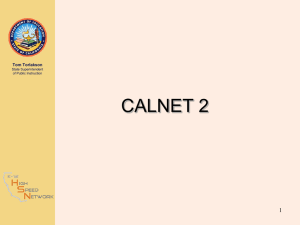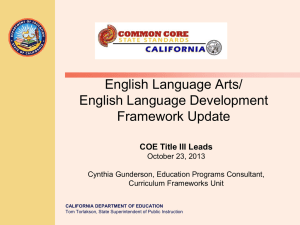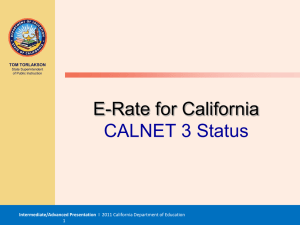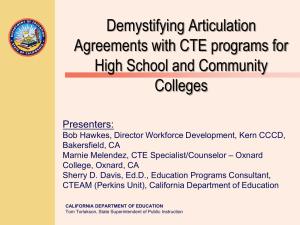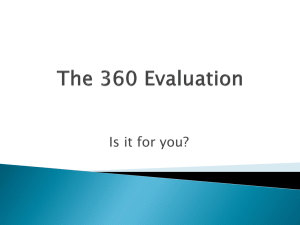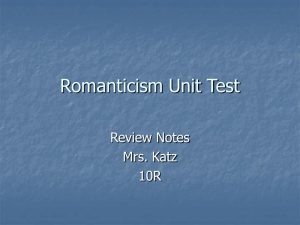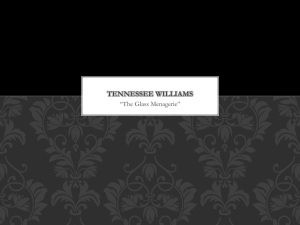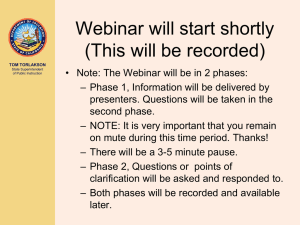PowerPoint Template - Forms (CDE Intranet)
advertisement
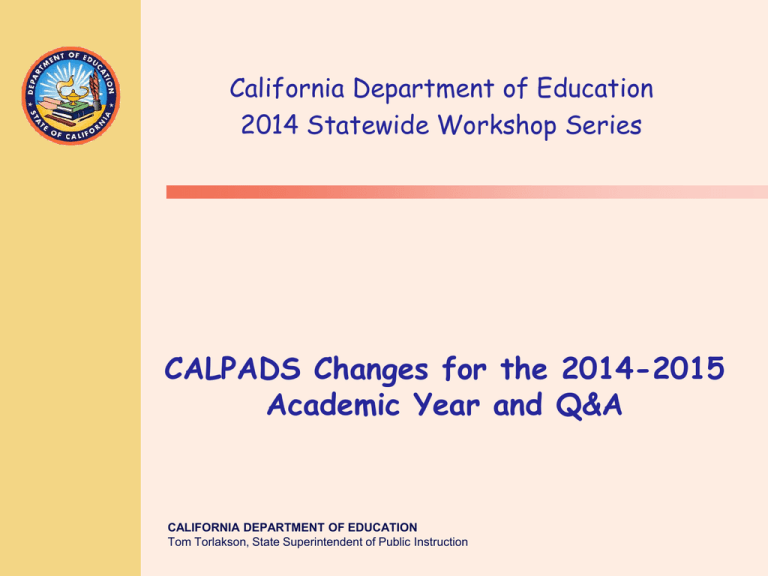
California Department of Education 2014 Statewide Workshop Series TOM TORLAKSON State Superintendent of Public Instruction CALPADS Changes for the 2014-2015 Academic Year and Q&A CALIFORNIA DEPARTMENT OF EDUCATION Tom Torlakson, State Superintendent of Public Instruction TOM TORLAKSON State Superintendent of Public Instruction Introduction Brandi Jauregui, Staff Information Systems Analyst CALPADS/CBEDS/CDS Operations Office Lead Analyst on the CALPADS Project since 2009 2 Agenda TOM TORLAKSON State Superintendent of Public Instruction • 2014-2015 CALPADS Major Changes Summary – Student Information File Changes – Student Enrollment File Changes – Student Program File Changes – Addition of new Student English Language Acquisition File • General CALPADS Q&A 3 General Change Implications TOM TORLAKSON State Superintendent of Public Instruction • End-of-Year Submission window will be shortened (July 18th) – NO AMENDMENT WINDOW • System shut down July 19th – July 28th to implement changes 4 CALPADS Data Takes Center Stage TOM TORLAKSON State Superintendent of Public Instruction • CALPADS data have become critical to funding, accountability, and assessment functions – Disadvantaged student counts for Local Control Funding Formula (LCFF) supplemental and concentrations grants – Student enrollment/exit, demographic, and program data are used to determine accountability subgroups – Enrollment data will be used to register students for the Smarter Balanced computer-based assessments. 5 2014-15 Change Overview TOM TORLAKSON State Superintendent of Public Instruction • High stakes data requires better quality. Highlights of the 2014 – 2015 changes include: – Redistribution of elements in the Student Information (SINF) file • Reduces frequency of submission – Utilizes students’ Grade Level from the Student Enrollment (SENR) record • Easier to associate a grade level with a specific enrollment – Requires enrollment records to be exited at the end of each school year – Creates a new file - Student English Language Acquistion (SELA) file, for the submission of English learner data • Reduces redundancy of records, increases data 6 integrity 2014-15 Change Overview TOM TORLAKSON State Superintendent of Public Instruction – Moves the District of Geographic Residence and Student School Transfer (formerly Interdistrict Transfer Category) fields to the SENR file format • Also adds two new Student School Transfer Codes to capture types of county office transfers for LCFF calculations – Adds new education program codes and data elements to the Student Program (SPRG) file format and retires the Primary Residence Code. • Homeless Program 7 • Foster Program TOM TORLAKSON State Superintendent of Public Instruction Student Information File (SINF) Changes 8 Current SINF TOM TORLAKSON State Superintendent of Public Instruction Student Information File • Grade Level Code • Interdistrict Transfer Code • District of Geographic Residence • Primary Language Code • English Language Acquisition Status Code • English Language Acquisition Status Start Date • Primary Residence Category Code • Student Proficient or Advanced for ELA Code • Remove all filler fields • Student Name Elements • Student Birth Date • Student Gender Code • Student Birth City • Student Birth State or Province • Student Race/Ethnicity Elements • Parent Highest Education Level • Parent/Guardian Name Elements • Address Elements • Student Initial US School Enrollment Date 9 NEW SINF Student Information File • Move to SENR TOM TORLAKSON State Superintendent of Public Instruction • Student Name • Grade Level Code Elements • Interdistrict Transfer Code • Student Birth Date • District of Geographic • Student Gender Code Residence • Student Birth City • Move to NEW SELA • Student Birth State or • Primary Language Code Province • English Language • Student Race/Ethnicity Acquisition Status Code Elements • English Language • Parent Highest Acquisition Status Start Education Level Date • Parent/Guardian Name • RETIRE Elements • Primary Residence • Address Elements Category Code • Student Initial US • Student Proficient or School Enrollment Date Advanced for ELA Code • Remove all filler fields 10 SINF – Change in Business Practice TOM TORLAKSON State Superintendent of Public Instruction Remaining information generally DOES NOT CHANGE Only required for NEW SSIDs and not for existing students unless there is a change Address info. should be updated annually (direct certification) Student Address file subtype will be available for these changes 11 SINF – Change Benefits TOM TORLAKSON State Superintendent of Public Instruction • Reduces redundant data • Only static data remain in the SINF • Reduces frequency of submission • Only required when data actually change (e.g., student address) • Moves elements that are known to change to other files 12 Change Detail Summary – Student Information File File Change These fields will be moved from the SINF to another file or retired: TOM TORLAKSON State Superintendent of Public Instruction SINF Moving to SENR: Grade Level Code Interdistrict Transfer Code District of Geographic Residence Moving to new Student English Language Acquisition (SELA) file: Primary Language Code English Language Acquisition Status Code English Language Acquisition Status Start Date Retired Elements: Primary Residence Category Code Student Proficient or Advanced for ELA Code All current filler fields Change in Business Practice Information generally DOES NOT CHANGE Only required for NEW SSIDs and not for existing students unless there is a change Address info. should be updated annually (direct certification) Student Address file subtype will be available for these changes Rationale/Benefit • Reduces redundant data • Reduces frequency of submission • Moves elements that are known to change to other files 13 TOM TORLAKSON State Superintendent of Public Instruction Questions? 14 TOM TORLAKSON State Superintendent of Public Instruction Student Enrollment (SENR) File Changes 15 SENR Grade Level Changes TOM TORLAKSON State Superintendent of Public Instruction Updated through the SENR Student School Start Date renamed Enrollment Start Date Two new Exit codes mid-year updates (E150) year-end enrollment exits (E155) Convert students’ grade histories to align with their enrollment histories 16 SENR- Grade Level Business Practice Changes TOM TORLAKSON State Superintendent of Public Instruction LEAs must exit all students at the end of the year with E155 (Year End Enrollment Exit) and a date of the last day of school (if returning to same school) beginning in May 2014 LEAs must enroll/reenroll all students each year with the date of the first day of school and a new grade level (if changed) SINF is NO LONGER REQUIRED ANNUALLY Any changes to grade data prior to 2014–15 can only be made online (no batch files) 17 SENR - Grade Level Change Benefits TOM TORLAKSON State Superintendent of Public Instruction Makes a student’s grade level clear throughout the year Smarter Balance registration 4-year cohort graduation rate Resolves summer concurrent enrollment issue 18 SENR Changes for Local Control Funding Formula (LCFF) TOM TORLAKSON State Superintendent of Public Instruction District of Geographic Residence and Student School Transfer fields are moved from SINF to SENR Two new transfer codes are added for county office of education (COE) to indicate the type of transfer Students transferring to COE voluntarily will be counted at districts of residence for supplemental and 19 concentration grants SENR - LCFF Business Practice Changes TOM TORLAKSON State Superintendent of Public Instruction • COEs must identify the following student populations for LCFF – Type “C” (expelled per Education Code Section 48915, on probation, or probation referred) – Juvenile Court students – All Others (voluntary transfers) • These students will be counted at district of residence for supplemental and 20 concentration grants. SENR – LCFF Change Benefits TOM TORLAKSON State Superintendent of Public Instruction • Enables the collection of data required for LCFF calculations pursuant to statute 21 Change Detail Summary – Student Enrollment File File TOM TORLAKSON SENR State Superintendent of Public Instruction Change Change in Business Practice Changes Related to Grade: updated through the SENR Student School Start Date will become Enrollment Start Date Two new Exit codes mid-year updates (E150) year-end enrollemnt exits (E155) Convert students’ grade histories to align with their enrollment histories Changes to Collect Data for County/LEA LCFF Calculations: District of Geographic Residence and Student School Transfer fields are moved from SINF to SENR Two new transfer codes are added for COE to indicate the type of transfer Rationale/Benefit LEAs must exit all students at the end of the year Students that are expected to return to same school, should be exited with E155, and a date of the last day of school LEAs must enroll/reenroll all students each year with the date of the first day of school and a new grade (if changed) SINF is NO LONGER REQUIRED ANNUALLY Any changes to grade data prior to 2014–15 can only be made online County offices of education must populate for all students (except those in Juvenile Hall schools), the Interdistrict Transfer field to identify which disadvantaged students will be attributed to their district of geographic residence for LCFF purposes Makes a student’s grade level clear throughout the year Smarter Balanced 4-year cohort graduation rate Resolves summer concurrent enrollments Enables the collection of data required for LCFF calculations pursuant to statute 22 TOM TORLAKSON State Superintendent of Public Instruction Questions? 23 TOM TORLAKSON State Superintendent of Public Instruction Student Program (SPRG) File Changes 24 SPRG – Program Membership Code Changes TOM TORLAKSON State Superintendent of Public Instruction Changes to Use of Membership Code Certain programs will always be treated as “eligible” and other programs will always be treated as “participating” Data submitted in Education Program Membership Code field will be ignored When a student exits a school, select program participation records will automatically be closed Title I Targeted Opportunity Program Pregnant or Parenting Transitional Kindergarten 504 Accommodation Plan Title I Part A Neglected California Partnership Academy 25 SPRG – Program Membership Code Changes TOM TORLAKSON State Superintendent of Public Instruction • Free or Reduced-Price Meal Program Records will now be closed automatically at the end of the year, regardless of exit code 26 TOM TORLAKSON State Superintendent of Public Instruction SPRG – Program Membership Code Change in Business Practice • LEAs no longer have to consider whether to submit a program as eligible or participating • LEAs no longer have to close program records when exiting a student • LEAs no longer have to close NSLP records at the end of the year 27 SPRG – Program Membership Code Change Benefits TOM TORLAKSON State Superintendent of Public Instruction • Streamlines the rules for processing program data • Saves time spent on closing program records 28 SPRG – Foster Program Change TOM TORLAKSON State Superintendent of Public Instruction Adding new foster program code Program Code 190 (Foster Program) Adding new field, Student Foster Identifier (Client ID) Must be populated if this type of program record is submitted Separate process to identify foster students via a direct matching process with Department of Social 29 Services SPRG – Foster Program Change in Business Practice TOM TORLAKSON State Superintendent of Public Instruction • LEAs that identify foster youth – based on a local match conducted with their county welfare departments – who are not identified by the statewide match should submit a program record to CALPADS identifying the student’s foster status – Should ONLY include students placed into foster care by court order – NOT students who are voluntarily placed – Currently working with legislative staff to clarify the definition of “foster students” for 30 LCFF SPRG – Foster Program Change Benefits TOM TORLAKSON State Superintendent of Public Instruction • Provides LEAs that identify foster youth based on local matches conducted with county welfare departments with a way to submit students’ foster statuses to CALPADS for purposes of LCFF 31 SPRG – Homeless Program Change TOM TORLAKSON State Superintendent of Public Instruction Adding new homeless program code Program code 191 (Homeless Program) Adding three new elements submitted for homeless students only Homeless Dwelling Type Code values stay the same as previous homeless codes in Primary Residence Category Unaccompanied Youth Indicator Runaway Indicator 32 SPRG – Homeless Program Change in Business Practice TOM TORLAKSON State Superintendent of Public Instruction • LEAs must collect two new statuses (unaccompanied youth and runaway) for homeless students; required for federal reporting 33 SPRG – Homeless Program Change Benefits TOM TORLAKSON State Superintendent of Public Instruction More effectively maintains homeless data Enables the collection of additional information about homeless students required for federal reporting 34 Change Detail Summary – Student Program File File TOM TORLAKSON SPRG State Superintendent of Public Instruction Change in Business Practice Changes to Use of Membership Code LEAs no longer have to consider whether to submit Certain programs will always be a program as eligible or treated as “eligible” and other programs will always be treated as participating “participating” Any data submitted in Education Program Membership Code field will be ignored Existing membership code data will be converted to align with new requirements Changes Related to Foster Status: LEAs that identify foster Adding new foster program code youth – based on a local Adding new field, Foster Client ID match conducted with their county welfare departments – who are not identified by the statewide match should submit a program record to CALPADS identifying the student’s foster status Changes Related to Homeless Status: LEAs must collect two new statuses (unaccompanied Adding new homeless program youth and runaway) for code homeless students; required Adding new element, Dwelling Type, to collect the dwelling type for federal reporting for homeless students only Adding two new elements, Unaccompanied Youth Indicator, Runaway Indicator Change Rationale/Benefit Streamlines the rules for processing program data Provides LEAs that identify foster youth based on local matches conducted with county welfare departments with a way to submit students’ foster statuses to CALPADS More effectively maintains homeless data Enables the collection of additional information about homeless students required for federal reporting 35 TOM TORLAKSON State Superintendent of Public Instruction Questions? 36 TOM TORLAKSON State Superintendent of Public Instruction Student English Language Acquisition (SELA) File Changes 37 SELA - Changes TOM TORLAKSON State Superintendent of Public Instruction New Student English Language Acquisition (SELA) file will include: Primary Language Code English Language Acquisition Status Code English Language Acquisition Status Start Date 38 SELA – Change in Business Practice TOM TORLAKSON State Superintendent of Public Instruction Primary language will no longer be used as a weight in SSID scoring (removed from SENR) Records should only be submitted when there is a change in status and upon creation of a new SSID “To Be Determined” will only be allowed as the first status for a new SSID The SSID extract will include students’ current ELAS facilitating upload of this data in local systems When LEAs submit a duplicate ELAS with a later start date, CALPADS will inform the user 39 that the data will be ignored. SELA – Change Benefits TOM TORLAKSON State Superintendent of Public Instruction Removing the primary language from SSID scoring will improve the list of students available for matching Processing the SELA in a transactional manner will make it clear when students’ statuses change Including the ELAS in the SSID Extract will enable LEAs a way to update their systems with the ELAS of new students Reduces the amount of redundant data currently in CALPADS 40 Change Detail – Student English Language Acquisition file File TOM TORLAKSON SELA State Superintendent of Public Instruction Change New Student English Language Acquisition (SELA) file will include: Primary Language Code English Language Acquisition Status Code English Language Acquisition Status Start Date Change in Business Practice Primary language will no longer be used as a weight in SSID scoring Records should only be submitted when there is a change in status “To Be Determined” will only be allowed as the first status for a new SSID The SSID extract will include students’ current ELAS facilitating upload of this data in local systems When LEAs submit a duplicate ELAS status with a later start date, CALPADS will inform the user that the data will be ignored Rationale/Benefit Removing the primary language from SSID scoring will improve the list of students available for matching Processing the SELA in a transactional manner will make it clear when students’ statuses change Inlcuding the ELAS in the SSID Extract will enable LEAs a way to update their systems with the ELAS of new students Collapsing ELAS history will reduce the amount of redundant data in CALPADS helping LEAs understand students’ previous 41 designations TOM TORLAKSON State Superintendent of Public Instruction General CALPADS Q&A 42 Contact Information CALPADS/CBEDS/CDS Operations Office TOM TORLAKSON State Superintendent of Public Instruction Brandi Jauregui, Staff Information Systems Analyst Bjauregu@cde.ca.gov * 916-327-7367 California School Information Services (CSIS) 916-325-9200 (Main Line) CALPADS Support Desk Calpads-support@cde.ca.gov 43
